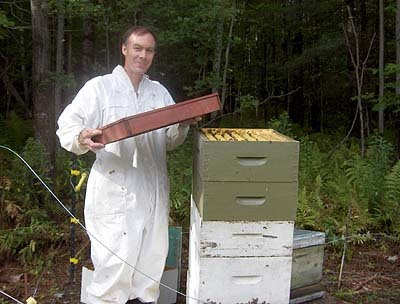
fall 2007
Love Your Mother Farm, Hinesburg, Vermont
Expectations are such a double edged sword. You have to have them since that’s what keeps us looking ahead, but it is so difficult when fate intervenes and alters our plans.
I became a beekeeper quite suddenly around this time last fall when a dear friend of mine, a brother, gave me two colonies of honey bees. I had never really considered keeping bees before and this started an entirely new journey for me filled with expectations.
I loved those bees. I enjoyed wrapping them up for the winter and checking on them so often. They were a new part of me as I cleared snow from their entrance and took such delight seeing an occasional bee flying out and then back into the hive during a sunny winter day. We were going to have a long and mutually productive relationship. I knew it. I expected it. I spent many a winter evening in the basement building honey supers and frames, reading my bee keeping books and looking forward to the activities of these wonderful bees come spring and summer.
Then came spring and I noticed there weren’t as many bees around as I expected. What happened? I did everything I could, didn’t I? They should be happy & thriving. For reasons beyond my control, these bees didn’t survive the winter. This is not uncommon as we have all learned, but it was still sad. I had grand hopes and expectations.
My friend knew all too well how I must have been feeling and provided me with two more colonies of bees. This was a blessing, considering how unfortunate I felt after losing my original two colonies.
This was going to be great. I was back as a beekeeper. It was spring, flowers were blossoming, and I was seeing honey bees everywhere. My expectations were back. I WAS going to be a successful beekeeper. I so loved watching the girls fly back to the hive with their pollen baskets full of the different colors of cargo. I spent time with my friend, watching & observing his skill, methods and love as he cared for his bees. I went to the Vermont Beekeepers’ lessons and observed how others cared for and loved the bees. I was back in the game; I expected lots from my bees with my new borne knowledge and the history of losing my last colonies.
Then, later in the summer, my bees were diagnosed with American Foulbrood, a seriously contagious disease to honey bees. The only remedy to prevent the spread of this disease to other bees is to destroy the colony and burn the hives. My bees, flying in from the field with their pollen sacs filled with goldenrod pollen, had to die. And much of my past winter’s work of building frames in the basement had to be burned to prevent further spread of this horrible disease. Once again, my expectations were shattered.
Before they passed on, my bees gave me a lot of honey – 100+ lbs. I am so appreciative for their work and think of them every morning as I take my spoonful of honey or when I give a jar or two of honey away. They gave me everything they could.
My friend has pledged to give me two more colonies and I am grateful. He has helped me to not give up on the bees. They are a part of me now and will continue to be as long as I live here.
The bees have sent me a message that I needed to hear. The relationships that I build in this life, whether it is with honey bees or any other on this earth, comes with my own expectations and I truly need to work on letting such pre-conditions go. I often like to think that I am in control of such outcomes and the bees have taught me to loosen my grip a bit. I believe that the Great Mother is in control. My purpose here on this planet is for my diligence, my love, my prayers and my acceptance in believing that there is a higher power looking after things.
This doesn’t mean that the bees are on their own. We, as beekeepers, have to be there to help them through their difficult times, especially as of late. But it does mean, at least to me, that it is not so much about me and my expectations.
Bless the bees.
Honey and Medicine: Past, Present and Future
P C Molan, Professor of Biological Sciences and Director of the Honey Research Unit University of Waikato, Hamilton, New Zealand
[Editor’s Note: This is the first in a series of abstracts from the 1st International Conference on the Medicinal Uses of Honey (From Hive to Therapy) held by Universiti Sains Malaysia in August of 2006. The abstracts have been published by the Malaysian Journal of Medical Sciences (Vol.14 No.1, January 2007).]
…”It is predicted that in the future it will be widely used prophylactically to prevent infection of patients with “superbugs” in hospitals, and will come into use as standard treatment for: leprosy; for all surgical wounds to prevent infection, prevent scarring, and speed healing; for burns, to prevent infection and prevent further damage to tissues caused by inflammation resulting from the thermal damage; to minimise burning from radiotherapy for cancer; to minimise effects on the gut of chemotherapy for cancer; and will be fully accepted by the medical profession as a legitimate modern medicine.”
Study: Honey Could Play ‘Important Role’ in Preventing Cell Damage
Influence of Honey on the Suppression of Human Low Density Lipoprotein (LDL) Peroxidation (In vitro)
Evidence-based Compl. and Alt. Medicine, 10/18/2007
…”Our study provides (for the first time) primary evidence suggesting that these honeys in further in vivo studies could play an important role in inhibiting lipid peroxidation in biological systems through their antioxidant, metal chelating and free radical scavenging activities…”